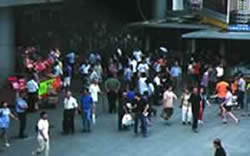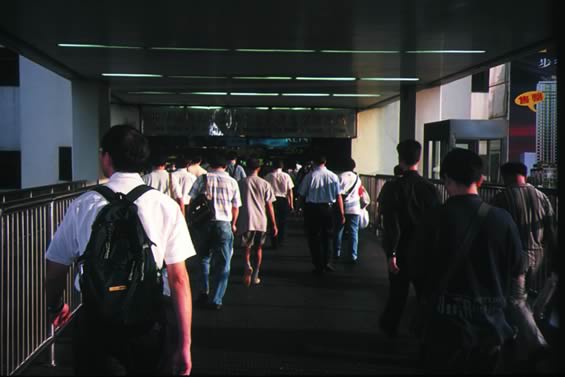Crossing the borderCommuting for a better life
The number of border crossings increased by 30 million from 1997 to 2000.
Alice TongOvercrowding sometimes triggers quarrels among commuters.
Alice Tong
By Wong Kayu
According to data obtained by the Immigration
Department, the number of border crossings
has increased from 56.3 million in 1997 to 86.5
million in 2000.
Mr. Chan Yiu Chung, a 42- year-old van driver,
goes back to Shenzhen to visit his wife once or
twice a week.
Said he: “Frankly, I got married to a Mainlander
partly because of lower costs of maintaining a
family there.
“I can rent a 500-square-foot apartment — decently furnished with a high ceiling and fresh air in a good location — for about Rmb1,000 in Shenzhen. But it would cost $4,500 in Hong Kong.”
Low-priced but comfortable accommodations are also a reason for Miss Kathy Lie Lai Wai to reside in Shenzhen.
Miss Lie is a research assistant in a hospital in Sha Tin. She makes a round trip between the two cities every day.
Miss Lie works in a hospital in Hong Kong, but her husband is a doctor in Shenzhen.
“It is difficult for me to work in a hospital in Shenzhen,” Miss Lie said. “Usually local graduates are assigned jobs by the related government departments. They fill up all the posts, and dismissals seldom occur. It has become a barrier to outsiders.”
In fact, her relatively high Hong Kong salary is the primary reason she stays.
“Of course I want to be closer to my husband, but the salary here for the same post is four times more,” she said.
Every day she spends around $50 travelling to and from the hospital by KCR. Her husband drives her to the Lo Wu KCR station in Shenzhen every morning and picks her up after work.
“Since I work only five days a week, the fare does not take up a large part of my income,” said
Miss Lie. “Of course I want the KCR to lower the fare, but this is improbable.”
Mrs. Chan Chow Ke Yee is a 28-year-old clerk for a law firm in Shenzhen who travels from Shenzhen to Hong Kong once or twice a week to meet her husband .
Although the couple is often separated. Mrs. Chan is content with such a relationship with her husband.
“We are a so-called weekend couple,” said Mrs. Chan. “If we got together every day, I would get bored.”
Nevertheless, building a family in Hong Kong is the couple’s common goal.
To return to Shenzhen, she has to get up at 6 a.m. to take a bus and a train before squeezing into the crowded departure centre.
“I am already exhausted when I settle down at my desk. However, it is only the beginning of my whole workday,” said Mrs. Chan.
Mrs. Chan also complained about the inadequate number of immigration counters in Hong Kong while noting that the counters in Shenzhen have greatly improved their efficiency.
She said, “On Monday mornings it takes three hours to travel between my home in Hong Kong and my office.
“I think the policy of the Hong Kong Immigration Department should be more flexible by opening more counters during peak times,” she said unhappily.
Miss Lie was also discontented with the lack of action displayed by the department.
“Even though it has observed the problem of overcrowding in front of immigration counters during
peak hours, it still insists on leaving many counters idle,” said Miss Lie. “They should increase the manpower in counter operations to alleviate the congestion, at least in the evening.”
Miss Lie often witnesses quarrels and fights among cross-border passengers.
“It is not uncommon to hear other people, usually men, roaring in foul language after being held up in the queue,” Miss Lie said.
“No one wants to be trapped there and we just want to go home, but sometimes it is difficult for us to keep patient. Therefore, a trivial thing can become a big deal to us at that moment,” she added.
Mrs. Chan said that a 24-hour operation would be helpful.
“It would stimulate consumption in Shenzhen,” she said. “Besides, I think the two immigration counters should be integrated into one to simplify the passport checking procedure.”
Despite the inconvenience, though, commuters are not going to stop travelling. Better housing, employment, and living conditions make them believe that it is worthwhile.

